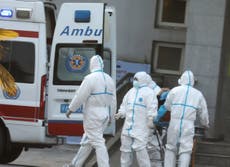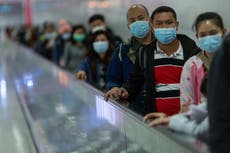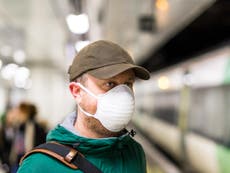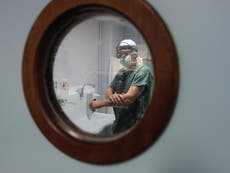The Independent's journalism is supported by our readers. When you purchase through links on our site, we may earn commission.
The markets don't just fear coronavirus – they fear Trump's response to it
Believing that the administration will ship 1 million coronavirus tests in the next couple of weeks requires believing a president on course to making 20,000 false statements in his four-year term
Worries about the impact coronavirus may have on the US economy weren’t reflected in the jobs report that came out Friday.
According to the report, the US economy added 273,000 jobs in February. Meanwhile, the unemployment rate fell a tenth of a percentage point to 3.5%, as average hourly wages rose a reasonably robust 3% from this time last year. If you didn’t know better, you’d think not much was going on in the world. In normal circumstances, a report that soundly beat expectations, as this one did, would make people feel good about the economy.
But as the financial markets have been telling us, it’s coming.
The first reason there’s nothing in the jobs report is that the numbers are based on surveys, and the surveys are always taken during the week of the month that includes the 12th. On 12 February, China had about 40,000 confirmed cases of coronavirus, and the US had seen no deaths from it. Today, China’s count is past 80,000, and US deaths have jumped from one to a dozen just this week.
On 12 February, airline stocks hit a recent peak. They’re down 30% since. Southwest Airlines reported that its business didn’t collapse until the first week in March – but then did so so fast that the company felt obliged to report it to the Securities and Exchange Commission immediately.
“We’re going to get much weaker job numbers going forward,” Moody’s Analytics chief economist Mark Zandi said Wednesday. “It is just a matter of time… Economists have a really hard time saying over 50% probability of recession. I assure you, almost every economist out there is thinking over 50% probability.”
Economists have a pretty good idea where the first signs of economic stress will show up in hiring data. Industries like tourism and restaurants will be on the firing line – both because they make money when consumers feel confident enough to spend, and because they often involve people going out in public as part of a crowd. Manufacturing would be a target because many of its industries rely on international supply chains running through China and other hard-hit nations. And oil and gas companies should slow hiring as low prices – oil has dropped $9 a barrel to $44 and change since 20 February, causing exploration companies temporarily to drill less.
None of those things happened in February. But they probably will, either in March or by April, unless the spread of the disease slows.
Manufacturers actually added 15,000 jobs, including 6,800 at automakers and parts companies, which itself is kind of remarkable as car sales flatten late in the expansion. Health and personal care stores – think places like pharmacy chain CVS,where you might buy cold remedies and hand sanitiser – added 10,900. Even oil and gas extraction added 1,100 jobs.
Maybe the first bad sign was 4,000 lost jobs at airlines, as international bookings began to shrink sooner than business at domestically-focused Southwest.
The most real-time jobs data is the weekly report on new claims for unemployment insurance, which comes out every Thursday, and that’s not showing any signs of distress either. There were 216,000 new claims last week – a recession would normally bring 400,000 new claims weekly.
So there are two big possibilities.
One is that the market has this situation sized up very, very wrong. In this view, there’s no reason for a TK% decline in the Dow Jones Industrial Average, or US interest rates falling to near zero (actually below zero when adjusted for inflation). Rates go that low when investors see so much risk of loss everywhere they look that they turn to government bonds at a small loss, reasoning that Uncle Sam at least will always pay them back.
The other is that the storm isn’t coming until next month at least. Those jobless claims suggest that even though companies like Amazon and Facebook are cutting back business travel and cancelling conferences, even letting employees work at home, they’re not laying off yet. Whether they are hiring as quickly is another question, one we can’t answer yet.
Also, Goldman Sachs reported Thursday that its proprietary data on consumer spending – everything from retail to theatre tickets and hotel rooms – is holding steady. So there’s no evidence yet that consumers are pulling back due to coronavirus.
Recent history suggests that even widespread coronavirus might not be ruinous. The 2009 swine flu pandemic killed more than 12,000 Americans, according to a 2010 report by the US Centers for Disease Control and Prevention, but the economy continued to bounce back from the 2007-9 recession even as more than 60 million Americans got sick. With 233 US cases, according to Johns Hopkins Medical School, we’re miles from that level, though the nature of pandemics like this is that they build geometrically over a few months.
In part, the market reaction to coronavirus – and stocks rose throughout the swine flu pandemic a decade ago, after being beaten down in 2008 – reflects nervousness about unsteady US political leadership.
Maybe President Donald Trump will find steadier footing (doubtful), or simply let public health officials less prone to exaggeration do most of the talking (better odds, but still unlikely, given the president’s love of cameras). If he does either, he has a chance to defuse the situation – and maybe save the expansion he hopes will get him re-elected.
After all, the administration says it will ship 1 million coronavirus tests in the next couple of weeks, making its response faster than the Obama administration’s to swine flu. But believing this requires believing a president on course to making 20,000 false statements in his four-year term.
So maybe our economic situation is one Franklin Roosevelt might have recognised: the only thing we have to fear is Donald Trump himself.






Join our commenting forum
Join thought-provoking conversations, follow other Independent readers and see their replies